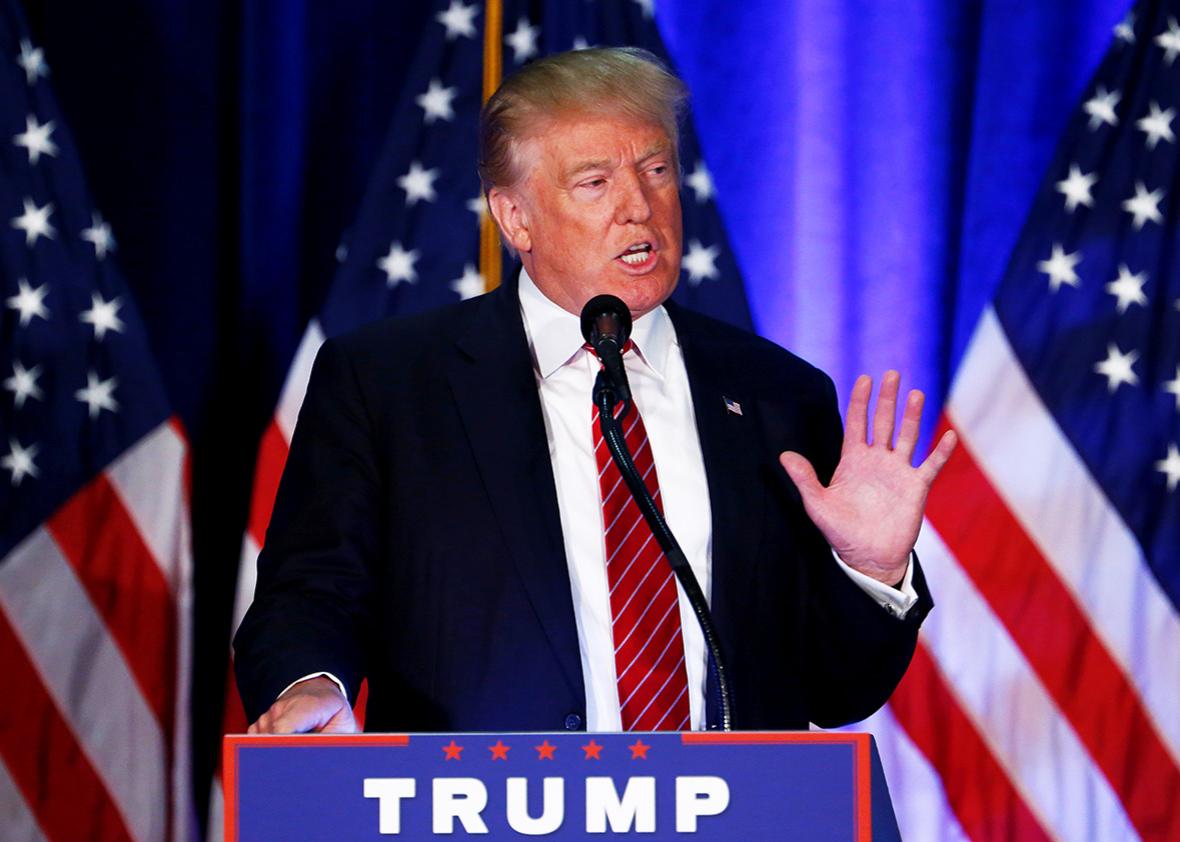Donald Trump’s predictably demagogic national security address in Ohio on Monday was filled with disgusting asides and mean-spirited policy proposals. It functioned as a bit of a greatest-hits package of ideas he has tried out in other speeches and on the campaign trail, such as banning certain immigrants (hint: they practice one particular religion) and getting good information from suspected terrorists (no hint necessary: he is gleeful in his approval of torture). But as his campaign shows signs of collapsing, Trump has inadvertently done something interesting. He has inverted the traditional duty of a responsible political journalist. At this stage in the campaign, the specific details of any given Donald Trump speech are much less important than what can be gleaned about the frame of mind of the man who is uttering them. We are all, in a way, Mark Halperin now.
The most surprising aspect of Donald Trump’s address was that his campaign shied away from billing it as a “relaunch” of his flailing campaign. It seems like only a week ago—in fact it was only a week ago—that Trump had another campaign relaunch aborted, this one after his big economic speech got lost amid his calling President Obama the founder of ISIS, and his “joking” about “Second Amendment people” taking some sort of action against (take your pick) Hillary Clinton or America’s judiciary.
So, this time around, perhaps realizing there wasn’t much point in overselling things, the campaign merely talked of a big, important speech. And, in typical Trump big-important-speech fashion, this one felt like something read off a teleprompter; it was relatively relaxed in manner of delivery, with fewer Trumpian flourishes than usual. When he began the speech by saying he wanted to “begin a conversation,” he momentarily sounded like a soothing television host rather than the unhinged pseudo-populist we have all come to know and love. Still, in very little time—but for a very long time—Trump was enumerating his bill of wrongs, gravely intoning all of the bad things that ISIS has done. It was reminiscent of some of the Republican convention speeches, in which sky-is-falling pessimism was leavened only by barely subdued anger.
Of course, there was one break from Trump’s dark picture. That was when he drew a portrait of life in the Middle East and North Africa before Barack Obama and Hillary Clinton entered the executive branch in 2009. Trump presented Libya, Egypt, and Syria as stable countries, and he mentioned that Iran at the time was being choked off by sanctions. He didn’t say that it was the Obama administration that had put the real squeeze on Iran via sanctions, nor did he mention that he supported the war in Libya that wrecked the oh-so-peaceful status quo. Needless to say, he blamed Obama and Clinton for the chaotic state of affairs today. (His attack on Obama for “apologizing for America,” as he tiresomely put it, sits awkwardly alongside his general take on America, which is that we are a horrific and bad place that has no right to lecture other countries precisely because of our awfulness.)
The main body of Trump’s speech was organized around the theme of, as he put it, halting “the spread of radical Islam.” “All actions,” he said, “should be oriented around this goal.” Trump then called for restricting immigration from countries that he deemed threatening, and applying an ideological test that would forbid people from entering whom he considered bigoted or un-American . Given that Trump spent a good chunk of time talking about Islam’s supposed hatred of women and gay people, one can only ask if Trump would deport people in his own party who share similarly retrograde views. As for the rest of the speech, it was a mixture of half-truths and outright lies. Trump, for example, did not oppose the Iraq war before it started. “I was against it, believe me,” Trump said, perhaps expressing a rare moment of doubt about his own truthfulness.
The reason that it’s not worth focusing too closely on the content of Trump’s speech—its place in our intellectual debates on foreign policy, its variety of “realism,” the ways in which it represented a tweaking of earlier policy positions—isn’t just that Trump is very, very unlikely to be president. It’s also that no one has any clue what sort of policies this obviously unstable and vindictive and impatient man would actually pursue in office.
Trump is sui generis in American politics, from his violation of various norms to his astonishing takeover of the Republican Party. But he has also changed the formula for proper journalistic coverage of a candidate. It was silly to focus on Al Gore’s outfits or Hillary Clinton’s tone of voice. But it isn’t silly to focus on how stable Trump seems during a certain speech—he was stable on Monday, for the record, which means he’ll have broken free of his moorings by Friday—or the precise way in which his campaign is trying to keep a lid on its candidate’s volatile id. And in Trump’s case, the reverse is true as well: While it is important and urgent to keep in mind that he is a racist and an authoritarian, it is silly to think too hard about the specifics of a foreign policy he put forth on Monday that could all easily change in an off-the-cuff moment on CNN on Tuesday. Trump’s policies may loosely cohere into some sort of familiar ideology, but his campaign and his ideas all basically exist within his head. And if the past year proves anything, it’s that his head is what needs examining.
